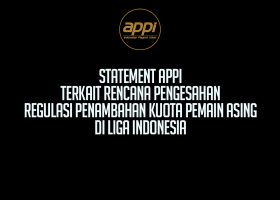Force Majeure: a term which became popular and most talked about in national football in the past two days. This relates to PSSI’s decision to discontinue QNB League 2015, because of Force Majeure. I would like to emphasize that this article does not have tendency to anything. I do not put myself to support or to be against with anybody. I just want to make a private literature about what Force Majeure is.
What is Force Majeure? The question which I believe pops up in most Indonesian footballers’ heads, and also mine. Based on my curiosity, I searched on some sources which can be used legally as references to figure out what force majeure really is, and other things that could be used as the bases to determine a force majeure situation.
Force Majeure means “Bigger power”. In context of law, force majeure means the clause which gives apology to a party in an agreement, to bear something “unpredictable” before, which impacts in the failure of fulfilling the obligation stated in the agreement.
The unpredictable thing is an unavoidable situation, in which we are unable to eliminate or prevent. Therefore, the criteria eliminate and prevent should be done, before judging if something is proper to be called force majeure.
What if one related party realized that there is a chance during the term of agreement, so it would be inevitable, and unable to be eliminated, and impacts in failure of fulfilling obligations stated in the agreement.
In a more specific scope talking about force majeure, it also can be called Acts of God or God’s willing. The circumstances that can be called as Acts of God are natural disasters, like flood, earthquake, tsunami, or volcanic eruption.
Not only Acts of God, force majeure can also be situations which bring great impacts, such as conflict, war, demonstration (we experienced this back in 1997 and the League was also suspended), economy crisis, or epidemic of disease (like Avian flu happened in Tiongkok back in 2004).
Force Majeure clause is generally related to unpredictable and abnormal things. To determine if an event is a force majeure situation, the event shall pass some tests as follows.
- Externality – Involving external party(es)
– The defendant must have nothing to do with the event’s happening.
Regarding this point, I believe that federation has good reason about the discontinuation of league: because of the Minister of Youth and Sports’ prohibition. Ministry, in this case, can be considered as external party, outside footballers, clubs, and federation.
This case may be acceptable, although from what I recognize, the government is fully supporting the decision to keep the league running under the applied terms and conditions. Instead, the federation discontinued it due to some reasons. - Unpredictability – Uncertainty
– If the event could be foreseen, the defendant is obligated to have prepared for it (thus, being unprepared for a foreseeable event leaves the defendant culpable).
I believe that federation should have predicted this, remembering that the situations (postponement and disallowance of the league) did not happen in a sudden. Some processes occurred (talk, negotiation, debates, and even resistance) which made the league postponed and disallowed. - Irresistibly – Inevitability
–The consequences of the event must have been unpreventable.
This point, I think, is the weakest point of the force majeure term stated by the federation. The postponement and disallowance are not considered as irresistible events.
What is happening now is very resistible. There are actually so many wiser ways other than to discontinue the league with force majeure as the reason. Federation seemed to ignore it, and confirmed that the situation happened because of force majeure.
It became stranger when the federation made an important decision (discontinuation of the League) without approval from, or listening to the club members’ opinion about it, whom are the stakeholders of PT Liga Indonesia, as the League’s operator. Federation did not consider opinions from coaches and players as well.
The decision reflects how hasty the Federation in deciding it, without looking at the future impacts on structure (clubs, coaches, and footballers). The decision is also potential in creating negative thoughts from many parties, if it is taken as a step to free them from all responsibilities.
It is interesting to see the reactions of related parties (clubs, coaches, and players) about the agreement which was categorized as force majeure, whether they will agree or not, since based on my opinion (correct me if I am wrong), a force majeure situation cannot be decided by one party only.
In summary, force majeure events may include any event beyond the control of the parties, such as a war, strike, riot, crime, or an “act of God” (e.g., flooding, earthquake, or volcanic eruption), such that the event passes the three “tests” listed above
Can the situation happening in the Republic of Indonesia be called Acts of God? I don’t think so. What is happening now is more to a reflection of how high and big the parties’ egos are. A good leader should be considerate about the complaints from the team. Even in an extreme idiom, a good leader is willing to die for the sake of his tea, not the other way around.
A story about General Soedirman once said “Do not sacrifice your men for your career; sacrifice your career for your men instead”.
Thus, according to the reference I have read and what I have explained above, with all due respect, and without favoring to anybody, I think that the situation happening is unable to be categorized as Force Majeure.
The maturity of a nation is not seen from how it appreciates diversity. More than that, it can be judged from how a nation is able to find solution for every problems occur regarding the diversity, in line with applied rules and regulations.
The end …
Bambang Pamungkas
ACTS OF GOD or ACTS OF GOD (father)?
It is not Indonesian football if it tells stories about achievements of National Team in many championships, achievements of clubs in running business and achievement plan to secure the financial health, trusted by sponsors and respected by Indonesian and foreign opponents, disciplined supporters, solid coaches and players with great characteristics in and outside the field, fair referee, football committee that always prioritize process for a strong national team and competitive professional leagues, appealing to sponsors, and government that cares and has courage to take actions; which ironically, those kinds of situations are what a country with the top 5 population in the world where football is the most favorite sport to play and watch hope for.
Without putting the “mess” aside, during the previous 5 years society has been shown a devastating and shameful condition, which happened not because of the main actors in the fields (players), but because of people outside it who were interested in snatching the “spotlight” from their role in Indonesian football. If we look back, the stories of Indonesian football is similar to the “series” of this country which tell about troubled, pointless life, and the story goes on until the rating does not meet the TV station’s standard. For example, organization dualism, league dualism, and national team dualism; in which I believe that only happen in our country, where the fighting parties are forced to show their strengths. I have a related story when I was attending player’s association congress in Asia and I was listening to the presentation about situation in Indonesia, the delegates from other countries asked “what is the current problem in your country?” and the chairman of congress said “we know the story of Indonesian football is impossible to tell even in a day, but according to the agenda of this congress, please deliver the story within 15 minutes.” and other delegates cracked smiles. They did not laugh but I might say that they cracked “confused smiles”. When the presentation was over, a delegate from Palestine told me that his country was having similar problem. The country was split into 2 by Gaza strip, and therefore it was hard for them to build a strong and solid national team, or else there would be violence on Gaza. Meanwhile, we did not have such thing in Indonesia and it was considered strange to have 2 national teams. What Soekarno said was right, that our struggle to face our own society is even harder than to fight colonies back in the days.
Aside from the dualism, a massive termination of contract to football players, coaches, and officials also happened (salary arrears) which brought us to circumstance where football players are frustrated, become unemployment, and some even died.
Dualism finally ended and now there is only 1 national team, 1 league, and 1 parent organization.
Indonesian Professional Footballers Association (APPI) stated in the beginning when the leagues were reforming, that the respective government should do a verification in order to prevent the devastating circumstances from happening again to the players in the future time. Unfortunately, the government had an agreement with operator of league on the verification process, they admitted that more than 75% of the clubs had failed to make it to the league but yet they still had the league run for the sake of the football players. But what they did left even more salary arrears not only to the players but also to other related parties. This continued to happen until the reformation of the league and the situation forced ISL in 22 clubs and surprisingly, the main division was included in 60 clubs. What happened? We all knew.
Reaching to the new season of 2015, where the government experienced changes in late 2014 with new Minister, and PSSI’s congress in April which determined the new committee, and the League was about to begin in February 2015. Verifications began to be done and Licensing Department had made decision that 22 ISL clubs passed through except for 2 clubs: Persiwa and Persik, regarding club financial problem. Another problem arose when Minister of Youth and Sports conducted the verification through BOPI and using their authority, they gave permission for sports match including football. The standard refers to FIFA licensing regulation about 5 requirements to be fulfilled whereas one of them is about financial: there has to be no arrears from last season for the clubs to engage. The suffering kept APPI, which had already released since November 2014, wrote a letter to Minister of Youth and Sports. The good news was until the time the league would be stopped from postponement, the number of under-qualified clubs decreased from 12 to only 1. We believed that our requirement had been fulfilled and we therefore appreciate the Ministry for Yourh and Sports through BOPI and the clubs.
Drama did not stop right there, since the Minister apparently formed Team 9 to take a closer look on other things especially the legality requirement related to tax. The requirement was incomplete and recommendation was not given to PT Liga, which was unable to hold the Leauge on the preferred time since the agenda of National Team in February was forcing PT Liga to run the League on April 4th. Minister of Youth and Sports and PT Liga agreed to hand the recommendations on the selected date if the legal requirements are completed. The recommendation letter was given from the Minister to 16 clubs, except for 2 clubs. Indonesian League then began and surprised everybody, and sheltering under FIFA, the 2 clubs that were not recommended played in the league.
The Minister then sent summons letter to PT Liga three times, and apparently the first letter was replied by PT Liga just as the Minister sent the second one, but they failed in fulfilling the requirements the Minister had asked. The Minister put PSSI in a postponement on the day PSSI held the congress in Surabaya. Before the congress began, PT Liga was forced to postpone the league because of the congress and Asian African Commemoration Conference (AACC) in Jakarta and Bandung.
PT Liga ignored the letter from the Minister and the League was continued on April 25th for ISL and on April 26th for the Main Division. But then clubs, coaches, and players were unsuccessful to join the league since they did not get permission from Indonesian police. PT Liga, again, was forced to put the league on hold because the national team’s schedule was tight, so the League was planned to start in June the earliest.
Meanwhile, the Minister ordered PT Liga to run the League under the transition team formed on May 9th 2015, instead of PSSI as mentioned in the letter. PT Liga refused to run the League unless it was under PSSI.
The situation forced players to be anxious and confuse about how they were going to survive, since football is the only occupation they had. On May 2nd 2015, the intensity raised when PSSI Exco meeting decided to terminate ISL because of “FORCE MAJEURE”. The decision made on Saturday, where everybody was enjoying their long weekend since the day before, made quite a scene on the media, and became headline of the day.
The phrase “force majeure” became trending topic among society, from upper classes to grass root, who would mostly misinterpret the news and create wrong perception. Force majeure literally means a situation beyond human control which impacts in a decision or action that has to be taken, liked or not. What would be the example? The example is on this article, where the author uses a lot of the word “forced” before he put apostrophe and type it on uppercase.
Is there any difference between force majeure and “FORCE MAJEURE” in legal context? The author believes that both terms are different. The force majeure in legal context makes all regulations have definition according to the requirements to fulfill the argumentation, so unlike the literal sense, it has to be more objective and agreed by all related parties.
FORCE MAJEURE CLAUSE CONCEPT
Before we go to further to force majeure, we have to recognize the Clause written above. This means that Force Majeure is put in to an agreement clause, in which there are parties to agree upon the clause. If both parties are agreed with the clause then there will be no problem, but if only one agrees, then the clause needs to be proven in the court whether the situation is proper to be called Force Majeure or not.
Force Majeure derived from French Law and if it is translated to English the meaning would be “superior force” (stronger force), or commonly called “Acts of God”. According to French Law, the phrase Force Majeure is an unseen or unpredicted situation which is unavoidable and the power of each party does not have anything related to it (Externality). If one party states Force Majeure to another party, then they have to prove it in the court. Force Majeure is commonly a situation where everything goes beyond human power or control, e.g. war, demonstration, criminal, or Acts of God like flood, earthquake, volcanic eruption, etc.
In USA, Force Majeure is related to “common law” and “contract law”, and does not have a measurement from private law of their own country, unlike France. The decision on whether a situation can be called as Force Majeure relies on different variables that occur in each case, by looking at the National Law, specific words mentioned in the agreement, many possibilities, court’s interpretation, etc. The basic reference before looking at the National Law in USA, we have to look at Black’s Law dictionary, which defines it as below.
“An event or effect that can be neither anticipated nor controlled. The term includes both acts of nature (e.g. floods and hurricanes) and acts of people (e.g. riots, strike, and wars).
In America, the court sentence on Force Majeure can be concluding as:
- Unstandardized Force Majeure clause
- The court is more likely to win the case which explained about the forcing situation in written
- Force Majeure is unacceptable to be the reason to forgive negligence
- Force Majeure often becomes the basic of breach of contract
Canada’s court has developed “doctrine of frustration” for cases with Force Majeure as the main reason because of Acts of God. In Canada, if the criteria are fulfilled, the court will release the obligation for parties involved in the agreement because of the Force Majeure.
In England, doctrine of frustration is known as The Implied Term Test. The test is done by analyzing the agreement made by parties, which indicates unpredictable and unavoidable circumstances.
What about in Indonesia?
In Indonesia, unfortunately, there are no exact definitions in the national law about Force Majeure. The basis of this case is as follows.
Article 1244 Indonesian Civil Code which states that debtor has to receive punishment to replace the charges, loss, and interest if he fails to prove that the cancellation or postponement of the event is caused by unexpected situation, which is unable to be justified to him, although there is no bad intention.
Meanwhile Article 1245 Indonesian Civil Code states that parties are discharged from any loss and interest if there is a party unable to outstand due to the force majeure or unexpected situation or if the similar things have done forbidden actions.
Indonesian Civil Code does not define further about:
- Force Majeure
- Unexpected situation
- Forbidden actions
In practical, Force Majeure clause adapts from external reference, as follows:
“There shall be no party which is responsible for the failure of implementations of obligations caused by Force Majeure. The Force Majeure means a situation happens beyond power and control of parties without any error or negligence element from both parties, caused by an event or forcing event, and the term includes Acts of God, fire, explosion, or any disasters; hurricane, blockage, war, strike, or demonstration, riot, acts of civil or military authorities.”
From the explanation above, the author sums up that Force Majeure Clause, especially in Indonesia, still brings different interpretations and disputes may occur if one party states this Force Majeure to other parties in the agreement.
Back to the Indonesian football drama, PSSI’s statement, which structurally perched on the top position in Indonesian football parent organization through the exco meeting with discontinuation of ISL as the decision because of Force Majeure, we shall see if the parties will agree and are ready to bear the consequences or will there be refusal of the decision so there will be many disputes?
THE PARTIES
Force Majeure clause binds the involved parties. PSSI stated in the decision that ISL was discontinued to PT Liga, and therefore the engagement is only between PSSI and PT Liga Indonesia as the operator of the league in Indonesia. The question arose was whether PT Liga agreed on calling the event as Force Majeure, and on the same day the question was answered. They both agreed on the Force Majeure, so ISL was discontinued because of this Force Majeure situation.
The next engagements are as follows:
- PT Liga as operator of the companies from ISL club which hot 99% of the stock? Do the clubs engaged with other parties agree that the Force Majeure is the reason ISL discontinued? If they agreed, the clubs should meet other parties from their companies, but if they did not agree, then there would be legal dispute, and the completion had been chosen and agreed in each agreement between the companies of clubs and PT Liga Indonesia.
- PT Liga as operator and official sponsors at least 2, sponsor which puts the name of the company in the League and Sponsor of Production Rights that is held by a production company.
Other engagement which is potential to create law polemic is the one between PT from the club and other party in the agreement they constructed themselves, which are:
- PT Club and Sponsor
- PT Club and Footballers
- PT Club and Coaches and officials
- PT Club and other party such as stadium rent, hotel, airplane tickets, etc.
And other parties that may impact from this problem, such as:
- The bearer of Production Rights and TV station that holds the Indonesian League broadcasting rights.
The footballer rights is interesting to observe because of the heterogeneity of contracts standards which is still valid until now, makes one contract explains and includes Force Majeure differently to another.
We ought to look at the continuity of the drama about Indonesian football series, will the forcing situation for the actors make them miserable as their role ends, or make them question about the “FORCING SITUATION” from the decision of Executive Producer, Producer, and Director, to keep the show running because there will be a lot of collateral damage while the rating is still high?
The forcing situation caused by Acts of God is inevitable because He has all the power in the world, and we have to surrender to the fate, as it cannot be changed and that the show should be over. On the other hand, the rumor says that the trigger of this forcing situation is Acts of God(father).If it is true, the author hopes that the situation is really triggered by Acts of God(Father), because Godfathers are all human being who have hearts, thoughts, and good feelings, so the actors and football lovers still have hopes for them to change, soften, and fair, so that they may be able to continue the football series to be a professional, qualified, and desired by other countries.
If that happens, the author believes that this series will become the longest one, the one with the most viewers, with a good storyline and played by great actors, managed by excellent executive producer, producer, and director, and nurtured by good and wise government.
It seems like a dream, but the author is in forcing situation to keep on dreaming and do whatever he can until the dream finally comes true.
Valentino Simanjuntak, SH, MH
The non-existence of a firm definition of force majeure brings different interpretations. One way to prevent the different interpretations about force majeure is to jot down events that are considered as force majeure in the agreement. That effort apparently was not enough; instead it had a tendency to blur the picture of what force majeure is.
In the current situation of Indonesian Football, PSSI use Force Majeure as excuse to discontinue Indonesian football competition. PSSI assumes that current situations (postponement of PSSI by Minister of Youth and Sports and the Minister’s letter to Indonesian Police Department) are the reasons the competition is being discontinued.
First of all, we need to know the definition of Force Majeure according to Indonesian Law:
– Indonesian Civil Code
Indonesian Civil Code does not recognize force majeure but Article 1244 Indonesian Civil Code states that debtor has to receive punishment to replace the charges, loss, and interest if he fails to prove that the cancellation or postponement of the event is caused by unexpected situation, which is unable to be justified to him, although there is no bad intention.
Furthermore, Article 1245 Indonesian Civil Code states that parties are discharged from any loss and interest if there is a party unable to outstand due to the force majeure or unexpected situation or if the similar things have done forbidden actions.
One example of standard clause of force majeure in the agreement is as follows:
“Nobody is responsible for inability to fulfill an obligation if it is caused by Force Majeure event. Force Majeure event is an event which happens beyond human control and power, without the element of error or intention from the defendants, caused by a situation or forcing situation and this term includes the Acts of God; fire, explosion, or other disasters; hurricane, blockage, war, strike, riot, demonstration, and civil or military authorities”.
PSSI’s reason to use Force Majeure clause to discontinue the League is being questioned, since the postponement of PSSI is not a sudden event or Act of God. The Minister’s decision to send out the Decree is because of PSSI’s ignorance of previous 3 letters from the Minister. The Minister permitted PT Liga Indonesia to continue the competition. The administrative sanction given to PSSI by The Minister was not Force Majeure, because the Minister had reasons to release the Decree. The letter from Minister to Indonesian Police Department on the disallowance of ISL was not a force majeure event as well, since this event was structured. The Minister questioned about the involvement of Arema and Persebaya in ISL since both clubs had not got recommendations until PSSI was given administrative sanctions which made it unable to get permission to run competition from Indonesian Police Department.
Frankly, the impacts occuring are nothing to be worried about, since the administrative sanction given from the Minister to PSSI made every PSSI’s products invalid. PSSI admits that it has been “discontinued” by the Decree of the Minister since PSSI claims the Ministerial Decree to the State Administrative Court. The problem is that PT Liga Indonesia and Club demand to run under PSSI. Naturally, they would obey PSSI’s decision, not to be forgotten that PT Liga Indonesia and Club have legal relationships with many parties. Internally, PT Liga Indonesia has legal relationship with Company (PT) which shelters the Club. Meanwhile Club has a contractual relationship with footballers, coaches, and team officials. Externally, both PT Liga Indonesia and the Club has business relationships with sponsor. Force Majeure is valid in this case if both or all related parties agreed to end the agreement with consensualism as argument between parties. Once again, we have to remember that this case has legal relationships not only between PSSI and PT Liga Indonesia or Club and PT Liga Indonesia/PSSI, but also between players, coaches, team officials, and sponsors.
Looking from footballers’ point of view, not all agreement includes Force Majeure or anything similar. The unilateral termination of agreement is possible to happen and again, the players will be the most disadvantaged party. Although all clubs would “obey” PSSI at the end, even lately there are some clubs that are not in line with the decision PSSI made, Force Majeure as the reason is unable to be applied to only one party (players, coaches, team officials, sponsors) related, which does not agree with the Force Majeure reason.
It takes wisdom from the policy makers to think about common good, especially for the sake of Indonesian Football.
M. Hardika Aji, S.H.






